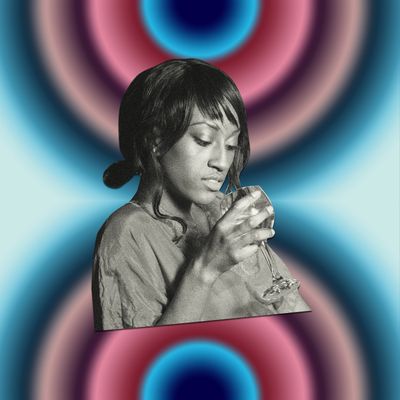
Is alcohol giving me wrinkles?
My friends and I are in our late 20s and drink on the weekends, in a social way. Like four to five drinks a night. I’m starting to notice some wrinkles and my skin not looking as great as it used to. Could the drinking be the problem, even if it’s only on the weekends? Is this going to affect how I look as I get older? —Anon.
Between the annual interest in Dry January and the Surgeon General’s recent warning about the health dangers of drinking alcohol, there are a lot of people thinking critically about how they drink. The experts I spoke to say there isn’t any data directly linking alcohol consumption to premature aging, but they say that the other health effects of drinking, and the cumulative nature of those effects, could be noticeable on your skin now and down the line. Read on to find out how drinking — even occasionally and socially — affects your skin, and what you can do to minimize its impact.
How exactly does alcohol affect your skin?
Anybody who’s looked in the mirror after a few drinks knows that alcohol does not-so-great things to your skin. First off, it modulates blood vessels, which, depending on your skin tone, may cause facial flushing and visible broken capillaries. It also has a diuretic effect that can cause dehydration. “This not only contributes to a hangover but also to a sallow and dull appearance of skin,” says physician Evan Rieder, who is board certified in both dermatology and psychiatry. And, he adds, when your skin is dry and sallow, even the faintest fine lines will be more noticeable. So, yeah, the morning after a night out with your friends, you may think you look wrinklier, but once your body has recovered and you’re no longer dehydrated, that effect should dissipate.
As for the longer-term effects, drinking regularly can exacerbate skin conditions such as rosacea, “especially the vascular component in which people flush and develop overgrown blood vessels,” Rieder says. And research indicates there may also be a relationship between alcohol consumption and the prevalence of inflammatory skin conditions such as eczema and psoriasis. “The reasons for this are complex, but we know that alcohol has a major negative impact on sleep architecture,” which is the body’s system for regulating stress responses. “This can have deleterious effects for many organ systems.”
Can drinking alcohol cause wrinkles?
Not directly. However, in one study of more than 3,000 people, researchers found that heavy drinking (defined as more than eight drinks per week) was associated with increased upper facial lines, under-eye puffiness, and midface volume loss. That’s not to say that alcohol caused those signs of aging. As aesthetician Jolie De Feis, who writes the newsletter Hotline Skin, points out, drinking also disrupts your sleep. And many people end up doing other unhealthy things when they’re out drinking. “Maybe you eat more fried, sugary, salty foods or are around more cigarette smoke,” she says.
How much is too much alcohol for my skin?
That’s hard to say. “It probably varies between individuals, and there are a multitude of factors which contribute, including age and underlying medical conditions,” Rieder says.
But the more you drink in one night, the longer your recovery process is going to take. “The diuretic effect really peaks about one to two hours after you have a drink, but it can last hours after that, and it’s cumulative,” De Feis says. “If you have four or five drinks in a fairly short period of time, that is all going to be cumulative, and it’s going to take like a day for your body to rehydrate fully.”
How can I decrease the negative effects alcohol has on my skin?
The easy answer is to drink less alcohol, which could mean decreasing the total number of drinks you have in a night or switching from high-ABV drinks (like martinis) to lower-ABV beverages, such as wine spritzers or sodas with bitters. Plus, “that old college rule of one drink of water for every drink of alcohol is really one of the best things you can do,” De Feis says.
You might also consider changing up the type of spirits you’re consuming. The fermentation process that creates alcohol also creates congeners, which are byproducts like acetone, acetaldehyde, and tannins. Rieder says there’s some evidence that higher levels of congeners may contribute to the severity of a hangover by increasing the body’s stress response and making it more difficult to break down alcohol. “While we don’t know how this exactly affects the skin, if the stress response is more severe and the metabolism of alcohol is slower, one can hypothesize that the effects on skin would be worse with alcohols with higher levels of congeners,” he says. So choosing drinks like white wine, light rum, light beer, gin, and sake that are typically lower in congeners than darker liquors like red wine, whiskey, cognac, and aged tequila might make sense.
Does getting sober help your skin?
Ultimately, your weekend partying probably isn’t aging you prematurely, but your skin would likely look better if you drank less — or nothing at all. Sobriety (absolute abstinence from alcohol) might not be for everyone, but some who have gotten sober do say it has made their skin much better. “If I see a client over a long period and I’m familiar with their skin, then they tell me that they’ve stopped drinking, I’ll definitely be able to notice it in their skin,” says Rieder. If nothing else, sobriety is bound to help you age … well, if not like a fine wine, at least like a good kombucha.
Send your questions to [email protected]. (By emailing, you agree to the terms here.)


